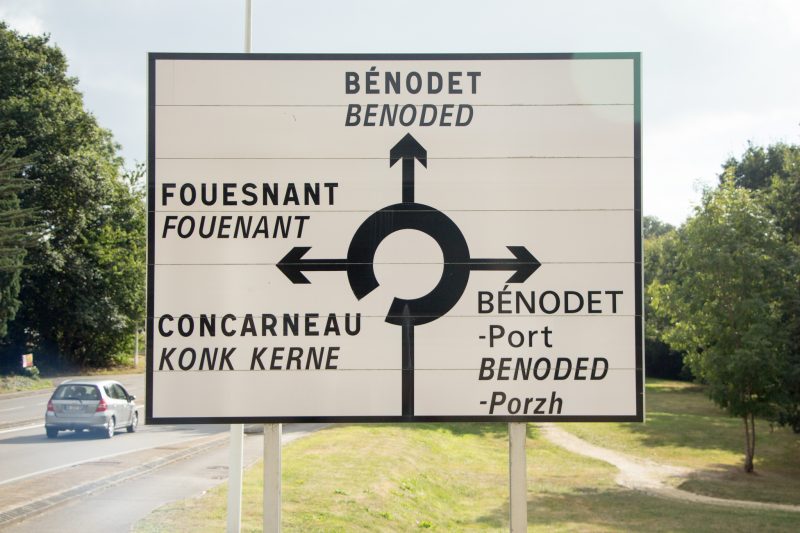
Segnali stradali e segnaletiche di negozi e ristoranti in questa zona sia in francese che in bretone (Brezhoneg). Foto di Sheep”R”Us utilizzato su licenza CC BY-NC-ND 2.0.
Di seguito una serie di interviste che si avvalgono dell'esperienza di Collaboratori nella Localizzazione, per fornire maggiori informazioni su bisogni, minacce e sfide affrontate dagli utenti che vivono e lavorano in diverse parti del mondo. Rising Voices ha ripubblicato vari articoli come parte di una collaborazione con Localization Lab. L'articolo originale [en, come tutti i link successivi, salvo diversa indicazione] si può trovare nella pagina Medium del loro sito.
Il bretone è una lingua celtica parlata in Britannia e in Francia. Nonostante i suoi parlanti siano passati da essere 1 milione nel 1950 a poco più di 200.000 oggi, stanno promuovendo la crescita della loro lingua. Le scuole bilingue “diwan” offrono un insegnamento del bretone in Britannia e secondo le stime il numero di bambini che stanno imparando il bretone è in crescita; tuttavia, come molte minoranze linguistiche, il bretone è in costante lotta per la sua affermazione.
Localization Lab ha parlato con un parlante bretone alla ricerca di spazi online per i parlanti della sua comunità.
Localization Lab (LL): Secondo te, le persone della tua comunità e le persone in Francia, generalmente come vedono il bretone?
Breton language localizer (BLL): This is a very complicated issue. During France’s Third Republic, Breton was banned entirely from schools, and there are many stories of children who were beaten by their teachers for using the language. My own father was beaten when he spoke Breton at school. This oppressive policy against minority language speakers lead to many people feeling ashamed to speak Breton — for some, this feeling still exists. Before WWII, there were so many of us and now there are only about 200,000 speakers. That means our speaking population has been cut down from around 1.5 million at the beginning of the 1900’s to the numbers we have today. So even though the government is working to support Breton now, it often feels like it is not doing enough.
Localizzatore della Lingua Bretone (LLB): È un problema molto complicato. Durante la Terza Repubblica francese, il bretone è stato totalmente bannato dalle scuole ed esistono molte storie di bambini che venivano picchiati dalle loro insegnanti perché lo parlavano. Mio padre stesso veniva picchiato quando parlava bretone a scuola. Questa politica opprimente ha portato ad un imbarazzo generale nell'uso del bretone — per alcuni, questo sentimento esiste ancora. Prima della Seconda Guerra Mondiale, i parlanti erano molti e adesso solamente 200.000. Questo significa che il numero di parlanti è diminuito di circa 1.5 milione dall'inizio del 1900 ad oggi. Anche se il governo sta cercando di supportare la lingua bretone, sembra spesso che non stia facendo abbastanza.
LL: Come scegliete gli strumenti per lavorare? Ci sono strumenti specifici, particolarmente importanti, per i bisogni della comunità?
BLL: I think it is important to work on tools that promote the Breton language for young people. Right now I am working on localizing video game software which targets teenagers. I want them to see the language in the games they play, so they can learn new words and expressions while having fun.
I am personally interested in projects like Tor and No Script because I think it is very important for everyone to protect themselves online. If Google Chrome were to offer me the opportunity to work on a project with them, I would turn it down. I prefer open source software.
LLB: Penso sia importante lavorare sugli strumenti che la lingua bretone promuove per i giovani. In questo momento stiamo lavorando sulla localizzazione di software per videogiochi per adolescenti. Voglio che leggano la lingua mentre giocano, così che possano imparare nuove parole ed espressioni e divertirsi allo stesso tempo.
Io personalmente sono interessato a progetti come Tor e No Script perché ritengo che sia importante proteggere se stessi sul web. Se Google Chrome mi offrisse la possibilità di lavorare ad un progetto, io rifiuterei. Preferisco softwer open source.
LL: Come è arrivata la tua comunità ad un consenso tecnologico? Quali sono le sfide da affrontare per creare nuove terminologie?
BLL: The Breton language has a public office which updates new terminology in a dictionary they have created. However, there is another “purist” dictionary by an organization called Preder which prefers to stay away from modern terms and instead looks to Old Breton and Middle Breton (sometimes even Old and Middle Welsh and Cornish) in order to have the most “celtic” source of words for their dictionary.
There is an interesting debate between both schools of thought which can be quite challenging to navigate. The public office allows for international loan words and others that have been “Bretonized” in their dictionary, whereas the Preder group feels that permitting those types of words promotes so-called “bad” Breton.
An example of this is the word “sandwich”. For the public office dictionary, the word “sandwich” is acceptable while the Preder dictionary prefers the term “bara pok ha pok” (literally translated as bread kiss and kiss).
There is a lot of conflict between these two approaches to Breton. Some people feel that incorporating loan words from other languages is not real Breton while others feel that purists, like Preder, are making things more complicated. An expression that people use when referring to this is, “Brezhoneg chimik eo” (it’s chemical Breton) which is a derogatory way for people to refer to purists, implying that they use a type of “chemistry” to invent complicated words.
LLB: La lingua bretone ha un ufficio pubblico che aggiorna la terminologia in un dizionario. Tuttavia, c'è anche un dizionario “purista” dell'organizzazione Preder che preferisce distaccarsi dai nuovi termini e focalizzarsi sull'antico o medio bretone (talvolta chiamato anche Antico e Medio Gallese e Cornico) in modo da utilizzare le fonti “celtiche” più antiche per il loro dizionario.
È in corso un dibattito interessante tra le due scuole di pensiero, abbastanza impegnativo da gestire. L'ufficio pubblico, che riconosce i prestiti internazionali e quelli che sono stati “resi bretoni”, e il gruppo Preder, che ritiene l'autorizzazione di questi tipi di parole promuoverebbe il così detto “cattivo” bretone.
Un esempio è la parola “sandwich”. Per il vocabolario ufficiale, la parola “sandwich” è accettabile mentre il dizionario Preder preferisce il termine “bara pok ha pok” (letteralmente tradotto come bacio e bacio del pane).
È in corso un grande conflitto tra i due approcci. Alcune persone pensano che quando vengono utilizzati prestiti da altre lingue non si parli di bretone autentico, mentre altri pensano che i puristi, come Preder, stiano rendendo le cose più complicate. Un'espressione molto utilizzata a tal proposito è “Brezhoneg chimik eo” (è una sostanza chimica bretone), è un modo dispregiativo per riferirsi ai puristi. L'espressione significa che i puristi utilizzano un tipo particolare di “chimica” per inventare parole complicate.
LL: In traduzione utilizzi un tipo di approccio “purista” o uno più flessibile?
BLL: I personally prefer the more flexible approach because the words are more understandable for everyone. I have participated in translations, like the translation of Firefox, that used a more purist approach but the meaning of some of the words was not always clear to me — and I am a translator! I think that if it’s difficult for me, regular people who use the tools will also be confused.
This is a big problem because if people become confused by the translation, they will probably switch to using the tool in French and that would defeat the purpose of translating it in the first place.
LLB: Io personalmente preferisco un tipo di approccio più flessibile così che le parole siano accessibili a tutti. Ho partecipato ad alcune traduzioni, come quella di Firefox, che usano un approccio purista, ma il significato di alcune parole non è sempre chiaro persino per me che sono un traduttore! Se è difficile per me, lo è anche per la gente comune.Questo è un grosso problema perché se le persone si confondono probabilmente finiranno per impostare lo strumento in francese e questo ostacolerà lo scopo della traduzione.
LL: Osservando nello specifico la localizzazione tecnologica, quali sono le sfide più grandi che ti trovi a fronteggiare con il bretone?
BLL: All Breton speakers can speak French because the Breton community was forced to learn French; however, not all Breton speakers can read in Breton. This poses a big problem when localizing software because a lot of Breton speakers are illiterate in their own language. For this reason, many people don’t want to use software in their own language. It’s difficult to say who is at fault whether it be the government, households, schools etc…
LLB: Chi parla bretone parla anche Francese perché la comunità bretone è stata costretta ad impararlo; tuttavia, non tutti i parlanti bretone riescono a leggerlo. Questo costituisce un grande problema per la localizzazione dei software, perché molti Bretoni sono analfabeti. Per questo motivo, molte persone non vogliono usare software nella loro lingua. È difficile da dire ma la colpa è del governo, delle famiglie, delle scuole, ecc…
LL: Qual è il consiglio che vorresti dare ai parlanti di una minoranza linguistica quando cercano di costruire una comunità e rendono vari argomenti accessibili alla loro lingua?
BLL: Behind all of the translations we are doing is a Facebook group that is dedicated to discussions around localization and translation. It is almost 100% in Breton and it aims to help the Breton-speaking community produce high-quality localizations for software. When someone has difficulty translating something into Breton, they can ask the community for advice. The group is very interesting because it is made up of people who prefer the purist approach and others who have a more flexible philosophy about the language. Some of our members even belong to the public office. There are some other groups out there that have these conversations without an element of respect. For us, respecting one another is key.
LLB: Dietro tutte le traduzioni che stiamo facendo c'è un gruppo Facebook che si occupa di discutere di localizzazione e traduzione. È tutto in bretone e punta ad aiutare i parlanti della comunità a produrre la localizzazione di sofware. Quando qualcuno trova difficoltà a tradurre in bretone, può chiedere aiuto alla comunità. Il gruppo è davvero interessante perché è costituito da persone che prediligono un tipo di approccio purista e da altri che seguono una filosofia più flessibile. Alcuni dei nostri membri appartengono anche all'ufficio pubblico. Ci sono altri gruppi che affrontano queste conversazioni senza rispetto. Per noi, il rispetto reciproco è fondamentale
LL: Se dovessi spiegare alle persone perché è importante la localizzazione di strumenti in bretone, cosa diresti?
BLL: For me, it is really important to make an effort to translate software into a lot of different minority languages. If we don’t work on these projects, we won’t challenge ourselves to grow as a language. We won’t challenge ourselves to build new vocabulary. By taking on these localization projects, it’s also a way to reappropriate the software for our own communities.
Some people ask me, “Why are you translating into Breton?”. Maybe they wouldn’t ask me this if I was a French translator because they would probably see the value immediately. But if Breton is still spoken now, it’s because a lot of people decided to create language associations to promote its use. They saw that the French government wasn’t doing enough to support minority languages, so they decided to interview the older generation of Breton speakers, to create and translate literature, like Jean de le Fontaine. The Breton language is surviving because a lot of speakers worked hard to preserve it and, nowadays, it is important for us to translate software if we want our language to survive.
BLL: Per me è davvero importante fare uno sforzo per tradurre software in diverse minoranze linguistiche. Se non lavoriamo a questo progetto, non riusciremo a far crescere la nostra lingua. Non costruiremo un nuovo vocabolario. Intraprendere questi progetti di localizzazione, è anche un modo per riappropriarsi del software delle nostre stesse comunità. Alcune persone mi chiedono, “Perché traduci in bretone?”. Forse non me lo avrebbero chiesto se fossi stato un traduttore francese. Ma se il bretone è ancora parlato, è perché molte persone hanno deciso di creare associazioni linguistiche per promuovere il suo uso. Hanno visto che il governo francese non stava facendo abbastanza per supportare le minoranze linguistiche, così hanno deciso di intervistare la generazione più anziana di parlanti per tradurre la letteratura, come Jean de le Fontaine. La lingua bretone sta sopravvivendo perché molti parlanti hanno lavorato duro per preservarla. Oggi è importante tradurre i software se vogliamo che questa lingua sopravviva.







